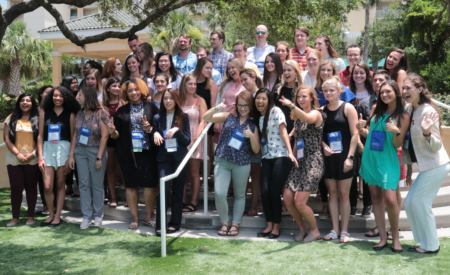Convention success (and photos), where are the vaccine injuries?, CBD and mice livers, and more
20 Jun 2019
Posted by Andrew Kantor
Did you miss us? We missed you. We were a bit busy at the Georgia Pharmacy Convention, though, but now we’re back with all the interesting pharmacy and health news you can shake a stick at … and more.
About convention
We’re still crunching the numbers, but it’s clear that this year’s convention was a huge success. We haven’t tallied the total education, or hours on the beach, but we know we had 54% more attendees this year than last year in Nashville — and about 14% more than last time we were on Amelia Island (in 2017).

Our favorite stat? The largest increase was in student pharmacists — we had more than double the number as last year!
Check out photos from the event at GPhAconvention.com/2019photos — and we’ll be adding to that as more folks send theirs in. And of course we’ll have a ton more to share on Twitter, Facebook, Instagram, and in the upcoming issue of Georgia Pharmacy.
Our award winners each got a short video, too — you can see them, and more, at GPhAconvention.com/2019videos.
We hope we saw you at this year’s convention, but if not … well, look at all you missed!
Georgia health still ranks low
Except for kids’ vaccination rates, Georgia continues to score poorly in healthcare. Georgia Health News has the details, but here are some highlights.
- The 2019 Kids Count Data Book ranked Georgia #34 for children’s health overall.
- The Commonwealth Fund’s 2019 Scorecard on State Health System Performance ranked Georgia #42 in overall health. (Our worst figures: “Uninsured adults,” “Adults who went without care because of cost,” and “Central line-associated blood stream infection.”)
- MoneyRates.com’s Best States for Healthcare 2019 ranked Georgia #49, with only Mississippi and South Carolina faring worse.
30,000 poor Georgians are about to lose health insurance
Last month the Department of Community Health said it was cutting off about 17,000 Medicaid recipients (and, it turns out, sometimes without warning). But now the agency says the real number is almost twice that, as it plans to cut off an additional 13,000 people.
And people who are cut off don’t always have the resources to plead their cases — they often don’t have transportation, can’t take the time off work, and don’t know how to navigate the system.
Callers to the state Division of Family and Children Services mostly get recordings, not people, and may not have access to computers or cars to drive to an office.
Insult, but no injury
Did you know there’s a national fund — the National Vaccine Injury Compensation Program — designed to pay people who have been injured by vaccines? (We’re talking about folks who legitimately have, say, an allergy to a vaccine, not “Timmy hasn’t been the same since he hit his head after getting his MMR.”)
So you might think, with folks claiming all these horror stories about vaccines, that NVICP would be inundated with claims. That turns out not to be the case. “Vaccine Injury Claims Are Few and Far Between,” in fact.
Potential downside to CBD
CBD products might be all the rage but — thanks to the lack of research on any kind of marijuana derivative — there haven’t been many scientific studies of it. The latest one might give some pause. Researchers at the University of Arkansas for Medical Science found that CBD appears to be at least as toxic to the liver as acetaminophen… at least in mice.
Researchers discovered that the mice given higher doses of CBD showed signs of liver damage within 24 hours. To that end, 75 percent of these animals in the sub-acute phase had either died or were on the verge of death within a few days.
Free market failure
You know that high drug prices can keep some people in the U.S. from taking their meds, but there’s a flip side: Sometimes when drug prices are too low, there’s not enough profit for manufacturers to bother making it, and that leads to shortages.
Today I learned
That in the U.S., bats are the most common carriers of rabies.




